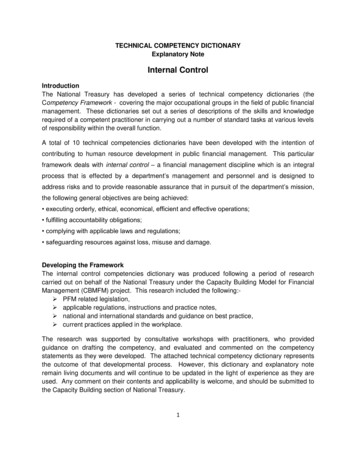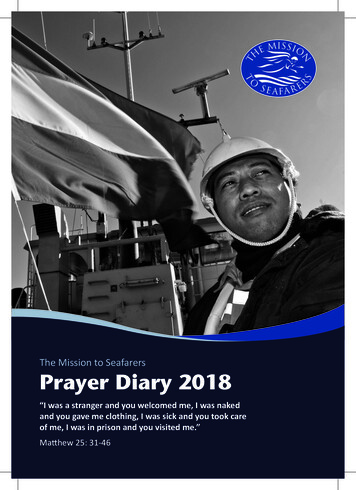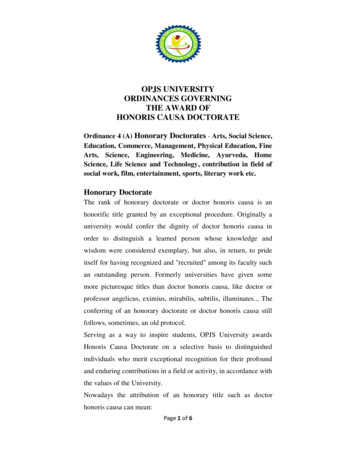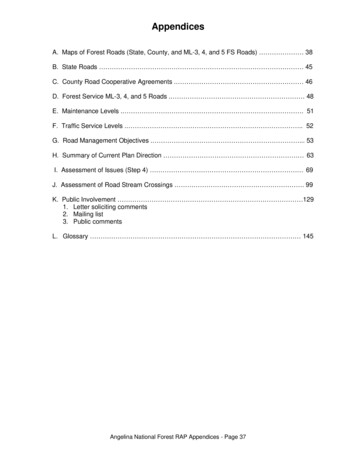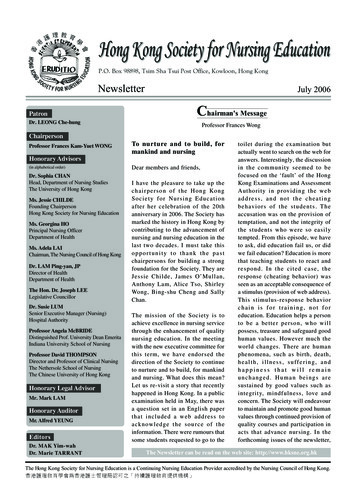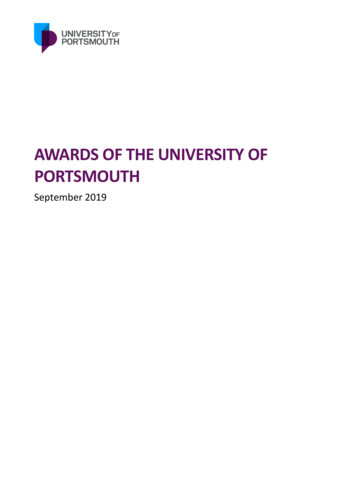
Transcription
DISCUSSION PAPERS IN DIPLOMACYThink Global, Act Local: Honorary Consuls in aTransforming Diplomatic WorldKevin D. StringerNetherlands Institute of International Relations ‘Clingendael’ISSN 1569-2981
DISCUSSION PAPERS IN DIPLOMACYEditor: Dominic Kelly, University of WarwickManaging Editor: Jan Melissen, Netherlands Institute of InternationalRelations ‘Clingendael’ and Antwerp UniversityDesk top publishing: Desiree DavidseEditorial BoardGeoff Berridge, University of LeicesterRik Coolsaet, University of GhentErik Goldstein, Boston UniversityAlan Henrikson, Tufts UniversityDonna Lee, Birmingham UniversitySpencer Mawby, University of NottinghamPaul Sharp, University of Minnesota DuluthCopyright Notice Kevin D. Stringer, November 2007All rights reserved. No reproduction, copy, or transmission of this publication, orpart thereof in excess of one paragraph (other than as a PDF file at the discretion ofthe Netherlands Institute of International Relations Clingendael) may be madewithout the written permission of the author.
ABSTRACTConsular diplomacy is taking on an ever increasing importance in the globalizedworld and economy, and may emerge as the more significant component ofdiplomatic power when compared to the traditional diplomacy exercised fromembassies. Consular diplomacy can be defined as the diplomacy conducted viaconsulates and consular representatives, focused on the classical activities of visafunctions, citizen services, representation, and issues of trade, tourism, andinvestment promotion between countries, localities, organizations, andindividuals. This paper concentrates on the understudied subject of honoraryconsuls and their conduct of trade, tourism, and investment promotion. It seeksto highlight how states are using honorary consuls to extend their network forincreased consular coverage; overview why localities, regions, and municipal hubsare increasingly more important than national capitals in terms of business andcommerce and thus in need of an honorary consular presence; and demonstratehow selected nations are using honorary consuls to develop their economies. Theconclusion looks at some of the still open research questions concerning the valueof honorary consuls to trade and investment promotion, in particular the linkagebetween assigning honorary consuls the task of trade, tourism, and investmentpromotion and their actual effectiveness in the role.ABOUT THE AUTHORDr. Kevin D. Stringer is an international banker and adjunct Professor of SecurityStudies at the Baltic Defence College in Estonia. He holds a Ph.D. in PoliticalScience/ International Relations from the University of Zurich, an MA inInternational Relations from Boston University, and a B.Sc. in Military Historyfrom the US Military Academy. He has served as a diplomat and military officer.His diplomatic research interests focus on consular diplomacy, the diplomacy ofautonomous regions, and the diplomacy and economics of microstates.Email: kevin-douglas.stringer@ubs.com
THINK GLOBAL, ACT LOCAL:HONORARY CONSULS IN A TRANSFORMING DIPLOMATICWORLDKevin D. StringerIntroduction: Consular DiplomacyConsular diplomacy is taking on an ever increasing importance in theglobalized world and economy, and may emerge as the more significantcomponent of diplomatic power when compared to the traditional diplomacyexercised from embassies. There is certainly a debate over what should beincluded under the aegis of consular diplomacy, and there is also a heavydegree of skepticism over whether all consular activities qualify as diplomatic.Several factors have contributed to this divisiveness over how consularactivities fit into the wider diplomatic world. Notably 1)2)In most modern diplomatic corps, the consular branch has beentreated as second class citizenry in terms of careers, promotions,prestige, and national relevance.1In a number of nations, traditional consular activities, particularly inthe commercial and trade development area have been allocated toother government agencies over time.In recent years, there has been a proliferation of diplomacies –commercial, economic, public, and other – that seemingly dilutes thepurist definition of the craft.2This was the author’s observation and experience from his service in the U.S. ForeignService. See also Mary A. Ryan, Assistant Secretary of State for Consular Affairs, speech,‘Future Consular Challenges: New Demands and a New Agenda’, AFSA Friday Forum,Washington, DC, December 6, 1996.For a good example of this proliferation of terms see Raymond Saner and Lichia Yiu,‘International Economic Diplomacy: Mutations in Post-modern times’, Discussion Papers inDiplomacy 84 (The Hague: Netherlands Institute of International Relations ‘Clingendael’,January 2003). In this paper they describe the transformation of diplomacy and the1
In a Westphalian world dominated by the primacy of states, therelevance of consular affairs in pure state-to-state relationships hasbeen questioned.Yet, just as the Westphalian system changes under the onslaught of largenumbers of significant non-state actors, so too must diplomacy. Although notwithin the scope of this paper, the question of whether diplomacy isundergoing a paradigm shift needs urgent exploration. With globalization, thenumber of actors beyond states grows, and this trend may even herald thatthe individual, in certain cases, becomes an important player on thediplomatic stage. If such a shift is occurring, at this retail level, consular affairsis not only important, but then would be unquestionably deemed diplomatic.For in general consular interactions occur more often with groups,companies, or individuals, rather than with hosting national governments.And if diplomacy is broadly defined as the institutions and processes by whichstates and others represent themselves and their interests to one another, thenconsular activities are certainly diplomatic.3This view of a transforming diplomacy is reinforced by CypriotAmbassador Euripides Evriviades who noted:Modern diplomacy goes far beyond the confines of relations between statesand between governments; it increasingly involves and incorporates thecitizen. No longer is the citizen merely a spectator, as the recent events inGeorgia, Ukraine, Lebanon and now Kyrgyzstan, have shown. As thewonders of globalization have forged new and more rapid networks of globalcommunication and interaction, diplomacy must also adapt and adopt newways to manage the speed and amount of information. Thus, while theavenues for diplomacy have widened, the vehicles for diplomacy must keeppace as well.4For this article, consular diplomacy is defined as the diplomacyconducted via consulates and consular representatives, focused on theclassical activities of visa functions, citizen services, representation, and issuesof trade, tourism, and investment promotion between countries, localities,3)4)2functions of economic diplomacy, commercial diplomacy, corporate diplomacy, businessdiplomacy, national NGO diplomacy, and transnational NGO diplomacy.See also Jan Melissen, ed. Innovation in Diplomatic Practice (London: MacMillan, 1999),xvi-xvii for a definition that encompasses states and other international actors.Euripides L. Evriviades, ‘The Demands of Diplomacy: The Role of Career and HonoraryConsuls’, The Whitehead Journal of Diplomacy and International Relations, Summer / Fall2005, 21-27, specifically 22.
organizations, and individuals. While these various consular functions havebeen looked at in various ways in an emerging body of diplomatic literatureon consular affairs, this paper will contribute to this rising collection byconcentrating on the understudied subject of honorary consuls and theirconduct of trade, tourism, and investment promotion.5Honorary ConsulsHonorary consuls are recognized under international law by the ViennaConvention. The convention provides the judicial basis and generalframework for consular relations between states and the delivery of consularservices.6 Article 1, paragraph 2 of the Convention states that consular officersare of two categories, namely career consular officers and honorary consularofficers. The Convention then goes on to define the rules that govern consularposts headed by honorary consular officers in its Chapter III.7 Very littleresearch or literature has concerned itself with this unique consular institutionand its capabilities, particularly in the trade, tourism, and investmentpromotion function.Although the Vienna Convention gives all consuls – career and noncareer – equal authority, each government assigns to its own consulates widelydifferent responsibilities. Typically, consular officers have two primary tasks: 5)6)7)To officially develop economic, commercial, scientific, and culturalrelations between the country they represent and the area in whichthe serve. Increasingly this means promoting commerce – trade,technology transfer, and investment – both ways.See for example on visa functions, Kevin D. Stringer, ‘The Visa Dimension of Diplomacy’,Discussion Papers in Diplomacy 91 (The Hague: Netherlands Institute of InternationalRelations ‘Clingendael’, March 2004); on citizen services, Maaike Heijmans and JanMelissen, ‘Foreign Ministries and the Rising Challenge of Consular Affairs: Cinderella inthe Limelight’, Clingendael Diplomatic Studies Program Paper (Hague: Netherlands Instituteof International Relations ‘Clingendael’, June 2006); and on representation Brian Hockingand Donna Lee, ‘The Diplomacy of Proximity and Specialness: Enhancing Canada’sRepresentation in the United States’, The Hague Journal of Diplomacy 1 (2006).See Heijmans and Melissen, ‘Foreign Ministries and the Rising Challenge of ConsularAffairs’, 8.See Vienna Convention on Consular Relations and Optional Protocols, U.N.T.S. Nos.8638-8640, vol. 596, 262-512, 24 April 1963.3
To safeguard the interest of the sending country and its citizenstraveling or resident in their consular district.8For this article on honorary consuls, and their role within a transformingdiplomatic system, the first mentioned consular task of trade and investmentpromotion is the focal point. This emphasis is germane for as former UnitedStates (U.S.) career ambassador Thomas R. Pickering observed on the futureof diplomacy, ‘To begin with, globalization will become ever more important.We will find ourselves working together in many different areas and arenas allaround the world. I would highlight economic, commercial and trade issues,which, in the context of globalization, will play a much larger role in ourinternational activities in the days ahead than they have in the past.’9In a discussion with the Ambassador of India to Switzerland at a SwissIndia Chamber of Commerce event, the author asked him how his embassydevelops commercial opportunities in Switzerland. He answered by sayingthat he believes the Swiss and Indian private sectors should do more, and thathis embassy staff were diplomats and not businessmen.10 Within thisstatement lies the true value proposition of the honorary consul, who ifproperly selected and directed, can bring business acumen, experience, andnetworks to consular diplomacy in order to develop trade, investment, andtourism opportunities for his appointing state. The institution of the honoraryconsul serves the transformation of consular affairs into the key element ofdiplomatic power by potentially creating commercial developmentopportunities that result in national economies moving up the trade andindustry value chain. The honorary consul performs in this arena by:8) Extending the representation network of state in a cost-efficientmanner in order to develop a wider network of investment or tradeopportunities. Linking the interest of a state directly into a region, hub, or locality ofcommercial value. Consular posts that concentrate on trade andinvestment promotion become more and more important as suchSee ‘What Consulates Do’, The National Association of Foreign Consuls in the UnitedStates, no date.9)Thomas R. Pickering, ‘Diplomacy: The Future’, The Fletcher Forum of World Affairs, Vol.29: 1, Winter 2005, 191-200, specifically 191.10) H.E. Mr. Amitava Tripathi, Swiss India Chamber of Commerce Luncheon, June 8, 2006,Zurich, Switzerland.4
consulates offer local communities and regions a direct and official tieto a foreign country and its resources.11 Developing business, tourism, and foreign direct investment (FDI)opportunities for the represented state in order for it to enhance itseconomy and in many cases move up the economic value chain.Although honorary consuls are used for more traditional activities likecitizen services, socializing, dinner parties, and cultural promotion, thefocused utilization of this consular affairs function for economic benefit seemsto be a growing trend. Although the numbers fluctuate, there may be around20,000 honorary consuls in the world today, performing in roles ranging fromthe social and cultural to the economic.12 This paper will seek to highlighthow states are using honorary consuls to extend their network for increasedconsular coverage; overview why localities, region, and municipal hubs areincreasingly more important than national capitals in terms of business andcommerce and thus in need of at least an honorary consular presence; anddemonstrate how selected nations are trying to use honorary consuls in orderto develop their economies. The conclusion will consider some of the stillopen research questions concerning the value of honorary consul to trade andinvestment promotion, in particular the linkage between assigning honoraryconsuls the task of trade, tourism, and investment promotion and their actualeffectiveness in the role.Extending Consular RepresentationUntil recently, the consular element of national diplomatic power played anessential, but often underrated and overlooked role in most states. Thecollapse of the bipolar world and the rising importance of ‘low politics’ havecreated the conditions for a potential transformation in the way diplomacy isconducted, and the function of the honorary consul, in smaller and morecost-effective constituent posts, focused on the promotion of trade,investment, and tourist interests can play a key role in this change.11)12)See ‘Making Consulates Work for You’, A Primer for State and Local Governments, TheNational Association of Foreign Consuls in the United States, 1997.See ‘You are appointed’, Hindustan Times, October 31, 2005.5
In looking at the conditions for a transformation in diplomacy, theunforeseen collapse of the Soviet Union marked a paradigm shift from abipolar to a unipolar world dominated by the United States. This unipolarsystem is not absolute or settled, with power diffused to certain regional blocsand countries. This situation creates an international arena that is confrontedwith a variety of transnational issues that often occur at the confluence of thedeveloped and developing world – transnational crime, narcotics,immigration, refugees, ethnic conflict, and environmental issues. Theseproblems must often be addressed directly and locally rather than from theoften-insulated capital city of a foreign country. This type of environmentconfirms the importance of a state having numerous constituent posts(consulates) located throughout key regions and countries that play a role inthese transnational issues. This wider net of consular outposts gives thenation-state the necessary presence, influence, and information-reporting baseto take action on relevant foreign policy issues in a proactive fashion.Furthermore, changing patterns of international tourism, cross-border capitalflows, international terrorism and natural disasters account for a surge inconsular challenges.The second dramatic change in the international environment is therapid globalization of the world economy. This shift to a global marketplaceemphasizes the increased importance of ‘low politics’ – trade, investment,tourism – all traditional consular areas of interest. This emerging trendcontrasts with the conventional diplomatic emphasis on military and politicalmatters. Since many areas of the world are becoming regional economic zonesas opposed to national economic zones, the necessity of widespread consularrepresentation takes on added importance. Coverage of these numerouseconomic zones and cities of commercial interest is a suitable deployment foran honorary consul.In terms of representation patterns, consulates and consular affairsshould be viewed in terms of a basic business model. Just as no business canrun solely from its headquarters, consular diplomacy needs to be conductedin outlying areas of the host country. This truism was unfortunately notapplied in the latter stages of the 20th century. In general, in the 1980s and1990s, fiscal austerity and the world political situation caused the closure ofconsulates in areas of the world where their presence could have providedcommercial and political leverage for the national interest. After closure, theconsulate functions were then often assimilated by the in-country embassy. Asan example, for the United States this measure was not new and served tohighlight the trend that has taken place since the 1930s. At that time, roughlyseven independent consular posts existed for each embassy overseas. By 1995,there were two embassies for every independent consulate. The reasons for6
this trend were many ---the end of colonial empires and the proliferation ofnew countries, budget constraints, and differences in strategic thought onconsular versus diplomatic representation.13 Fortunately, this tendency ofcentralization in consular affairs has been reversed in the first decade of the21st century.In his book The World is Flat, Thomas Friedman reinforces this simplemessage that would seem to apply just as well to the business of diplomacy asit does to the business of business. To be successful, organizations mustspread out, and it is the horizontal concerns, not the vertical, that own thefuture. Successful players in today’s world are those who are on site whensomething happens — able to influence events, report on them andimmediately engage key players.14 And those who require engaging are nolonger clustered in capitals. The latter point could be key. The core functionof diplomacy has traditionally been to influence governments— somethingthat is done in capitals by embassies, largely through formal channels.Consulates in this model are an extension of embassies, and exist primarily tooffer a geographic augmentation of the embassy’s reach in limited corefunctions. This organizational chart rests on the assumption, however, that allof a nation’s interests can be met by other central governments and thatnational governments are informed about and manage all that happens ontheir territory.15 This assumption is factually invalidated by empiricallyobserving any number of states today in the international system. Regions asdiverse as Catalonia, Andra Pradesh, and California’s Silicon Valley are quiteautonomous from the national government, especially in the economic fieldsof endeavor.In order to localize and extend diplomatic presence into outlying regionsand provinces, a number of countries are establishing new consulates inpreference to opening embassies As part of this effort, and to be more costeffective, they are also expanding their networks of honorary consuls. Thefollowing paragraphs highlight this trend through a number of countryspecific examples that start with the smaller states of the world.One of the most creative ways in which microstates can extend theirinternational engagement is through the use of consular representation. Some13)14)15)See Kevin D. Stringer, ‘Brave New Consular World’, Foreign Service Journal, June 1998,13-15.See Thomas Friedman. The World is Flat: A Brief History of the Twenty-first Century (NewYork: Farrar, Straus and Giroux, 2005).Keith W. Mines, Foreign Service Journal, March 2006, 50-54, specifically 50.7
microstates rely almost entirely on consular representation for their links tothe outside world. Monaco has seven diplomatic missions but 43 consularmissions; Luxembourg has 20 and 35, for San Marino there are 8 and 47 andfor Malta 15 and 82.16 Liechtenstein has not established any consular missionsitself, largely because of its representational agreement with Switzerland, butnearly all the states accredited to the Principality are at the consular level.There are approximately 38 consulates resident in Monaco alone. However,these microstate consular relations are based almost wholly on the services ofthe non-professional or honorary consul. Unlike career consuls, honoraryconsuls are appointed locally and need not be citizens of the state which theyrepresent. Their postings are not dependent on special training orexamination and they usually receive little or no remuneration. Mostimportant, honorary consuls can engage in private professional or commercialactivities. The attractiveness of the posting for the consul is that the prestigeafforded by consular designation can be an advantage in private business. Onthe other hand, honorary consuls can be expatriates or ‘good friends’ of thestate which they represent and noted for their long and conscientious service.On occasion they may be very distinguished personages within the host state.For many years, the hotel magnate, Sir Charles Forte, served as San Marino’sconsul in London. With little or no capital expenditure, the honorary consulsystem is an economical means of achieving representation on a scaleotherwise unlikely. It is also a resourceful arrangement, for it brings to theservice of the microstate those whose familiarity with local conditions andpersonalities can be invaluable.17For comprehensive global coverage, the slightly larger state of Icelandheavily uses honorary consuls for trade and investment promotion in localregions. As H.E. Mr. Halldor Asgrimsson, Iceland’s Minister of ForeignAffairs and External Trade stated, ‘You [the Honorary Consuls of Iceland]are our extended foreign service in your home countries and in many placesyou are the only Icelandic representation.’18 Iceland has a total of 253honorary consuls, and their role has not diminished with globalization. On thecontrary, their roles have expanded in terms of promoting Iceland’s economy16)The actual current number of honorary consuls for a specific country may vary from thenumbers given in this paper, as the numbers quoted are based upon the source documentand its snapshot view at its date of publication.17) See Barry Bartmann, ‘The Microstate Experience: Very Small States in the InternationalSystem’, chapter for Hvitabok (The White Book) (Torshavn: Foroya Landstyrri, September1999), 19-20.18) H.E. Halldor Asgrimsson, Speech, Fourth Conference of Honorary Consuls of Iceland,Reykjavik, Iceland, October 2, 1995.8
to an increasingly interested world. In addition to the traditional fisheriesindustry, Iceland’s commercial ventures have expanded into various industriessuch as banking, software, biotechnology, aviation, prosthetics, and genericpharmaceuticals. The importance of consuls for a small state such as Icelandis obvious, and is in fact increasing. Iceland is one of several states whosehonorary consuls by far outnumber its career consuls. In fact Iceland has onlytwo consulates headed by career consuls, in Winnipeg and in New York,where the consul is also Iceland's deputy permanent representative to theUnited Nations.19 Thus, honorary consuls have played and will continue toplay a key role in promoting Iceland’s opportunities.Similarly, in order to meet its global foreign affairs requirements, Canadalooks to honorary consuls for the future. Honorary consuls have been part ofthe Canadian diplomatic presence since 1947. The program expanded slowlyuntil the late 1970s at which time it started to grow rapidly. Today, there are118 honorary Consul positions located in 77 countries performing a variety ofduties including consular, trade, immigration, culture and developmentassistance. Honorary Consuls provide a Canadian presence where it is neededand where Foreign Affairs Canada (FAC) does not have consular offices.20For instance, in viewing the scope of the American market, the Canadiangovernment has come to the realization that many of its core interests with theUnited States cannot be successfully managed through Washington alonebecause of the diffusion of power in the American political and judicialsystems, and the subsequent influence on the economic sphere. Canada hasinitiated a major push to establish small consulates throughout the U.S. topromote its interests from the bottom up, starting with states that are involvedin water and key trade issues. Some Canadian officials even speak of the needto have a presence in all 50 states.21Canada launched the Enhanced Representation Initiative (ERI), whichwas formulated in 2004. This new framework is seen as an innovativeapproach to managing Canada’s special relationship with the US and a bettermeans of building and managing a ‘strong partnership’. According to a seniorFAC official closely involved with its development, the ERI is a uniqueapproach to Canadian representation since it encompasses a ‘whole-ofgovernment approach’ to the US relationship, involving fourteen government19)20)21)Prime Minister David Oddsson, Speech, 7th World Consular Congress, Athens, Greece,November 24, 2003.See Review of Consular Affairs, Final Report, Office of the Inspector General, Foreign AffairsCanada, Evaluation Division, Ottawa, Canada, November 2004, 43.Keith W. Mines, Foreign Service Journal, March 2006, 50-54, specifically 51.9
departments in the delivery and management of Canadian diplomacy acrossNorth America. The ERI has expanded Canadian representation with abroader geographical reach of consulates and consuls across the U.S.Particular emphasis is given to developing Canadian representation in areas‘outside the Beltway’: in the south-west, as a response to the shift in power inthe U.S. from the east coast to the south-west during the Bush presidency; aswell as the north-west, driven by the need to develop better advocacy andbusiness development in this region of notable trade disputes in lumber andwheat.22 ‘Stronger’ representation has thus partly meant enhancing thediplomatic network in the U.S. At the time of launching the ERI inSeptember 2003, the aim was to increase significantly the level of Canadianrepresentation through opening new consulates (six by December 2005)together with a new consulate-general in Denver, thereby increasing theoverall network to 22 offices. These have been supplemented by appointingthirteen honorary consuls, with more appointments planned.23 InternationalTrade Canada is currently expanding its use of honorary consulates as part ofthe ERI with plans to create 20 new honorary consulates in the United States.These new honorary consuls will be devoted solely to trade and advocacyservices.24Also for Canada’s southern neighbor, such a horizontal model fordiplomacy — as opposed to a vertical one — has similarly been suggested by anumber of senior U.S. policy-makers and analysts. While serving as U.S.envoy to Moscow, Ambassador Thomas R. Pickering traveled extensivelythroughout the Russian Federation. The vastness of the country left himsobered, especially considering that he was attempting to gather informationand represent U.S. interests from only the embassy in Moscow and theconsulates in St. Petersburg, Yekaterinburg and Vladivostok.25 An extensionof consular posts via the honorary consul function could have widened hisnetwork, and provided platforms for not only trade development andinvestment promotion, but also for the American public policy apparatus.26In one of her key 2006 speeches, United States Secretary of StateCondoleezza Rice reaffirmed the need for greater representation, by defaultmore consular posts or variants, when she stated,22)23)24)25)26)10Hocking and Lee, ‘The Diplomacy of Proximity and Specialness’, 31-32.Hocking and Lee, ‘The Diplomacy of Proximity and Specialness’, 47.See Review of Consular Affairs, Final Report, 45.Keith W. Mines, Foreign Service Journal, March 2006, 50-54, specifically 51.The United States does not appoint honorary consuls but uses consular agents instead.
Our third goal is to localize our diplomatic posture. Transformationaldiplomacy requires us to move our diplomatic presence out of foreigncapitals and to spread it more widely across countries. We must work on thefront lines of domestic reform as well as in the back rooms of foreignministries. There are nearly 200 cities worldwide with over one million27people in which the United States has no formal diplomatic presence.Interestingly, smaller nations seemingly have been more progressive inenlarging their diplomatic networks and utilizing honorary consuls for staffingthese extensions. For example Cyprus relies almost exclusively on the workperformed internationally by honorary consuls. Cypriot honorary consulatesnumber 119, almost three times the number of diplomatic missionsmaintained abroad. By the sheer weight of demography and the burden ofgeography, the consul is the key to building the bridges and bonds offriendship between nations and peoples. In the United States alone, Cyprusmaintains fifteen honorary consulates in such diverse places as Chicago,Phoenix, Atlanta, New Orleans, San Francisco, Boston, Washington state,Houston, and Jacksonville, North Carolina. Given the prominent role thehonorary consuls play in representing Cyprus abroad and because ofEuropean Union accession and the responsibilities that come with it, there area relatively strict set of criteria for the selection of the individual who will beentrusted with the duties of the honorary consul.28As part of the consideration to increase representation through honoraryconsuls, cost plays a large role. While embassie
Studies at the Baltic Defence College in Estonia. He holds a Ph.D. in Political Science/ International Relations from the University of Zurich, an MA in International Relations from Boston University, and a B.Sc. in Military History from the US Military Academy. He has served as a diplomat and military officer.

